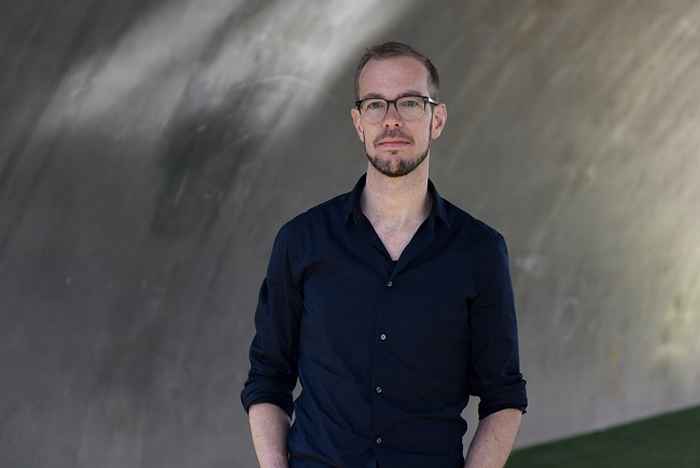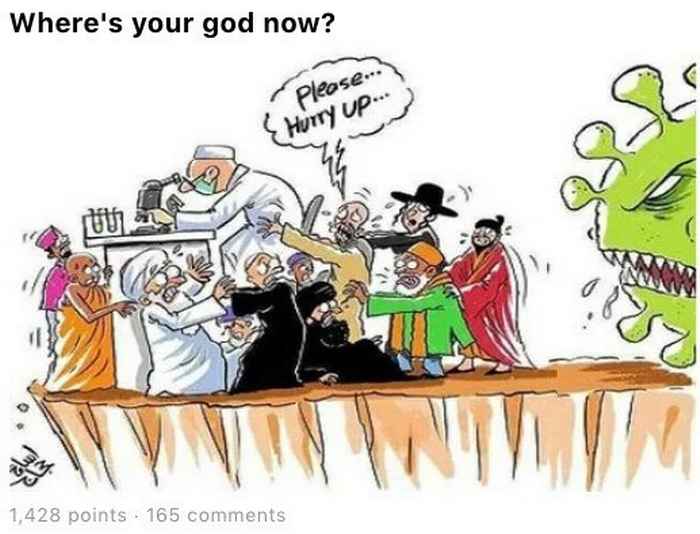Does praying help?
24 March 2020

Besides a call for joint prayer, there is also a cartoon making the rounds on social media depicting religious leaders desperately gathered around a scientist staring through a microscope with the caption 'Please.... Hurry up'. Its message is clear: in times of crisis, people's hopes are pinned on science developing a vaccine as quickly as possible, while religion stands powerless against the unprecedented disaster the world is facing.

A fundamental need for control
Many studies show that people have a fundamental need for control. In these uncertain times, we do whatever we can to feel a certain sense of control. Some buy surgical masks and hoard supplies, while others organise a national day of prayer.
Prayer helps, because it gives us a sense that all is not lost. That, in the end, there is a God pulling the strings. Prayer offers us a way to experience a sense of control over a situation that is hardly controllable at all. And it is that sense of control that helps us make it through these trying times.
Prayer as the ultimate coping mechanism
A great many studies show that prayer is the ultimate coping mechanism, and helps us deal with difficult situations such as illness, death or the loss of a loved one. The ideal form of coping seems to be a collaborative one, whereby the believer prays, but also takes action. The idea behind this is that you don't leave everything in the hands of God, but you also do what is within your own power.
In our current situation, this mostly translates to 'stay the fuck home'. Take heed of the hygiene regulations and use your common sense to look for solutions – just like the scientist in the cartoon is doing.
Does prayer actually help?
But does prayer actually help? In the Dutch newspaper Trouw of 18 March, Christien Crouwel (General secretary at the Council of Churches of the Netherlands) noted that 'there are plenty of miracles surrounding prayer left in the world today. I believe that when people focus their effort on a single intent, that this stirs something within them. What happens next, however, is out of our control. That is in the hands of God.'
While that may be the case, a lot of research has been done into the efficacy of prayer, which have unfortunately yielded rather disappointing results. This mostly relates to studies into what is called 'remote intercessory prayer', praying from a distance, whereby God is asked to heal a specific group of individuals, for example.
This type of research has never been able to prove any significant effects as a result of prayer. All results could be explained as chance findings or attributed to the placebo effects – if you believe in it, it will work.
Prayer can offer psychological support
However, even the placebo effect has its limits, and it probably won't fare well against the coronavirus. Hoping, thinking or praying that you don't get infected will unfortunately offer no guarantee that you make it through this crisis intact. What prayer can offer, however, is some psychological support that helps us feel connected and helps us hold on to hope. Besides, it can't hurt to try.
A national day of prayer might help
A quick prayer can never hurt, so even if you don't believe, you can still pitch in on a national day of prayer. 'Maybe this crisis will help create a certain insight into what we as a society may have lost along the way. Connection to others, care for the environment, the ability to slow down, the limits of production', says Crouwel.
A national day of prayer might help us to reflect on these things – to take a moment and realise that this crisis is forcing us to incorporate mindfulness into our lives.
About Michiel van Elk
Michiel studied philosophy, biological psychology and the psychology of religion in Utrecht, Amsterdam and Njjmegen. He completed his PhD in Cognitive Neuroscience at the Donders Institute in Nijmegen (cum laude) and was a visiting researcher at UCSB in California. He worked as a Marie Curie post-dotoral fellow at the EPFL in Switzerland. Since 2013 he is working as assistant professor at the University of Amsterdam supported by grants from the Templeton Foundation, the BIAL Foundation and the Dutch Organization for Scientific Research. In 2017 he has been a visiting scholar at Stanford University supported by a Fullbright Scholarship. He also participates in the Religion, Cognition & Behavior Lab of the University of Amsterdam, focusing on the psychological and neurocognitive mechanisms involved in supernatural beliefs, mystical experiences and related phenomena. In 2019 / 2020 he is spending his sabbatical at the Netherlands Institute for Advanced Studies (NIAS) in Amsterdam.